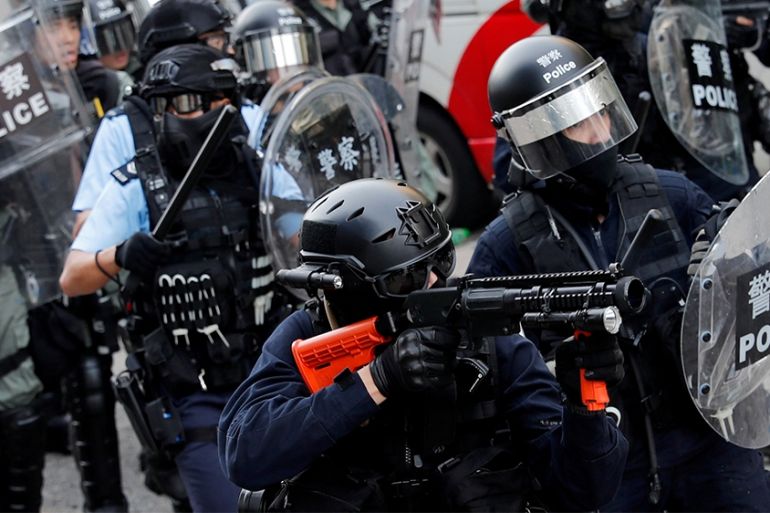China underlines hands-on HK role with pledge to help police
Pubic Security Ministry says it will ‘guide and support’ Hong Kong police to ‘stop violence and restore order’ in city.

China’s public security ministry pledged to “guide and support” the Hong Kong police force after China’s parliament approved a decision to impose a national security law on the semi-autonomous territory, underlining Beijing’s intention to take a more hands-on role in law enforcement in the city.
China’s Ministry of Public Security (MPS) – the national police force – would use “all efforts to guide and support the Hong Kong police to stop violence and restore order,” it said in a statement released late on Thursday.
Keep reading
list of 3 itemsHong Kong police storm through barricades at protester stronghold
Hong Kong probe exonerates police over protest handling
Hong Kong’s police force is independent from China and the MPS currently has no enforcement powers in the former British colony.
China says the national security law will aim to tackle secession, subversion, terrorism and foreign interference in Hong Kong, with details expected to be drawn up in coming weeks.
The new legislation will enable Beijing to establish intelligence agencies in Hong Kong, including a domestic intelligence agency potentially involving the MPS and the Ministry of State Security, China’s main intelligence agency.
Beijing is imposing national security legislation on Hong Kong after months of sometimes-violent pro-democracy protests that began almost a year ago when the government tried to introduce an extradition bill that would have allowed people to be sent to the mainland for trial.
Allegations of brutality
Under the terms of Hong Kong’s handover, it is supposed to introduce national security laws on its own, but no government has attempted to do so since Tung Chee-hwa was forced to back down over the issue in 2003. Hong Kong’s Basic Law or mini-constitution, also provides for significant autonomy for the territory including rights unknown on the mainland such as a free media and the right to protest.
|
|
The legislation has sparked fresh protests in Hong Kong, with critics saying it could erode the city’s freedoms and jeopardise its role as a global financial hub.
The MPS statement called for “striking a severe blow against infiltration, subversion and sabotage by hostile forces at home and abroad” and for “conscientiously studying and implementing” the NPC’s decision on Hong Kong.
The Hong Kong police have arrested thousands of people since the demonstrations began. Protesters have accused the Hong Kong police of using excessive force and demanded an independent inquiry into their policing of the rallies.
Earlier this month, a report from the police watchdog into police conduct concluded that the use of force was as a result of “illegal action by protesters” and suggested allegations of police brutality were being used as a “political weapon”.
The Independent Police Complaints Council (IPCC) made 52 recommendations to the police on strengthening operational guidelines. The accountability of individual officers was not within the scope of the report, it stressed. The panel’s international experts quit last year amid concerns about its independence.